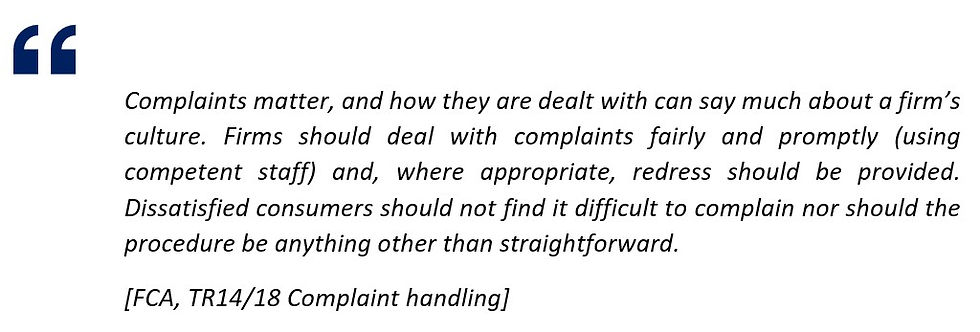%2024%20(1).png?width=150&height=161&name=Recognised%20CPD%20Badge%20(transparent)%2024%20(1).png)
Complaints: The Hidden Signals
Your Data Might Be Showing
Author: Priscilla Gaudoin - Head of Risk & Compliance - First published in May 2023
Topics: Complaints, Consumer Duty, Culture
Regions and Regulators: UK, FCA

Time to read: 2-3 minutes
The FCA’s thematic review on complaints handling took place almost 10 years ago, but its findings continue to be relevant and are echoed in the FCA’s Consumer Duty work.
The regulator aims to ensure firms treat customers fairly by supporting those in difficulty and providing customers with information to enable them to make good decisions. Indeed, the FCA‘s business plan and long term strategy also indicate the importance of data. The regulatory returns submitted to the FCA enable it to identify and track early indicators, thus enabling speedy regulatory intervention where warranted.
Nick Hulme is the FCA’s Head of Department for Advisers, Wealth and Pensions, and addressed PIMFA’s Financial Crime Conference in May 2023. In his speech, he emphasised that the FCA will be more proactive and assertive. That message is not new and whilst it was said within the context of financial crime, it’s been repeated over the years. Nick’s message was that the FCA intends to give little to no notice of firm assessments where there is a risk of harm.
Over the last decade or so, we’ve seen regulators worldwide investing in resources, including technology, to help them identify trends and to be more proactive. We’ve seen the FCA improving its systems, not just to ease the burden of regulatory reporting, but to improve their own processes and enable the early identification of harm to the consumer and the markets. Firms should be under no illusion; more proactive and assertive regulatory interaction will increase.
Where do firms need to focus attention?
Firms must investigate a complaint and engage in effective complaint handling by assessing fairly, consistently, and promptly whether the complaint should be upheld and what remedial action or redress may be appropriate. The final step is to clearly explain the decision to the customer and undertake the remedial action or pay the redress.

This is understood by most firms, but what some may fail to grasp is that complaints handling isn’t a box ticking exercise. It’s not a question of logging a complaint and resolving it as quickly as possible. Firms need to examine the complaints data to identify internal gaps in their processes, people’s understanding and to nurture the right behaviours to deliver good outcomes for the consumer.
What could be improved?
During the FCA’s thematic review, it identified several areas where firms should focus more attention. These were:
- Ensuring the process has the interests of consumers at heart
- Ensuring that staff understand the definition of a complaint
- Enabling accurate recording of complaints and root cause analysis
- Ensuring consistency in redress and inconvenience payments
- Improving management information

Supervisory focus:
From the very moment a firm seeks authorisation, the regulator begins assessing the level of risk that firm might pose to consumers and the financial markets. As a firm then gains authorisation and conducts business, the regulatory reporting and notifications help the regulator to build a picture of how the firm is operating in practice.
With increasing regulatory data requests and the adoption of SupTech by the regulators, it’s crucial that firms don’t just collate complaints data and send it off to the regulator. Firms need to interrogate that data internally and consider what other management information is needed to help identify and mitigate risk, but also demonstrate that they are providing the good outcomes for their customers.
The supervisors focus on a firm’s culture and the behaviour within it, which is evident by how a firm treats its customers. Thus the importance attached to understanding how a firm handles its complaints.
Each firm needs to adopt key measures appropriate to its business model as well as the complexity and risk profile of the services provided. However, there are some common flags that help a firm gain assurance that it’s doing the right thing. Positive data might include:
- low volume of complaints compared to business undertaken (Eg # of complaints per account or size of the business)
- high proportion of complaints closed within 8 weeks
- low percentage of complaints upheld by the Ombudsman service
Firms should consider what additional data is needed to identify any further causes for potential harm. Additionally, they should ensure that root cause analysis is undertaken and processes improved to enhance the corporate culture and demonstrate good outcomes for the customer.
Leverage Technology:
Ruleguard is designed to help you capture and process events. All complaints can be logged directly within Ruleguard, and a workflow spanning many events and owners can be designed to see complaints through to completion. Ruleguard users see their next actions in an easy-to-understand inbox view, making the process of managing complaints straightforward and robust.
Finally, detailed MI can be produced to simplify the process of audit, and to give you insights about the root causes of your complaints and how efficiently they are being processed.
This includes the ability to:
- Classify complaints to facilitate root case analysis and map complaints to relevant regulations
- Produce detailed MI to simplify process of audit, and provide insights about the root causes of your complaints and how efficiently they are being processed
- Ruleguard's powerful rules-mapping system allows firms to link issues directly to the relevant regulation. It is also possible to link risks, controls, and business processes.
If you’d like to learn more about the Complaints Management Solution please contact us for further information on: Tel: 0800 408 3845 or hello@ruleguard.com.
Related Webinars, White Papers and Blogs
Ruleguard hosts regular events on various regulatory topics. You can watch our webinars on-demand at your convenience, or read our blogs, white papers and tune in to our podcasts.

How Ruleguard can help you
Find out how Ruleguard's Complaint Management Software helps firms capture, track, and resolve complaints efficiently, ensuring compliance and improving customer outcomes through clear workflows and actionable insights.
About the author
She is a Fellow of the International Compliance Association, a certified GRC practitioner, and a member of the Institute of Risk Management.

.png?width=300&height=175&name=webinar%20featured%20image%20April%2025%20-%20How%20can%20firms%20improve%20compliance%20monitoring%20v1%20large%20(5).png)



.png?width=300&height=175&name=webinar%20featured%20image%20April%2025%20-%20Avoid%20the%20pitfalls%20proactive%20compliance%20monitoring%20v1%20large%20(1).png)




